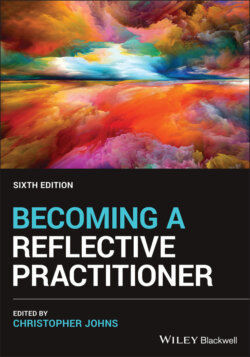Читать книгу Becoming a Reflective Practitioner - Группа авторов - Страница 16
Professional Artistry
ОглавлениеBefore exploring the nature of reflection, it is necessary to consider the type of knowing it generates, what I term professional artistry stemming from Schön’s description as the ‘kinds of competence practitioners sometimes display in unique, uncertain, and conflicted situations of practice’ (Schön 1987, p. 22). Adding to Schön’s description ‘set against a background of realizing one’s vision’.
Every experience is unique. It cannot be determined. We may have many similar experiences that serve to inform our interpretation and response. There can be no prescriptive solutions. As such, practice is largely intuitive, drawing on our tacit knowing. By tacit, I mean knowing that is not easily articulated. We can only know our practice through reflection as something lived rather than as something theoretical. Take the example of caring. Frank (2002, p. 13) writes:
Caring is one of those activities that people know only when they are involved in it. From within, and only from within, caring makes sense. To try and explain care leads to the circularity expressed in statements such as ‘caring for this person requires doing this, and I do this because I care for this person’. Philosophy teaches that, for some activities, there is only practice.
It follows that if we accept Frank’s position, we can only know caring from within caring – the professional artistry perspective. Caring cannot be known as a technical or abstract thing. The practitioner knows self as caring only within the moment.
King and Appleton (1997) and Cioffi (1997) endorse the significance of intuition within decision making and action following their reviews of the literature and rhetoric on intuition. They note that reflection accesses, values, and develops intuitive processes.
Aristotle drew a distinction between practical wisdom and theoretical wisdom. Practical wisdom does not result in knowledge that is determinate and universal; indeed, it does not result in propositional knowledge at all but in discriminations and actions.
Technical rationality (or evidence‐based practice) has been claimed as necessary for nursing’s disciplinary knowledge base because it can be observed and verified (Kikuchi 1992). Historically, professions such as nursing have accepted the superiority of technical rationality over tacit or intuitive knowing (Schön 1983, 1987). Yet, a technical rational mentality is likely to lead to stereotyping, fitting the patient to the theory rather than using the theory to inform the situation. This mentality inevitably leads the practitioner to fit the person to the theory, thus reducing the patient/client to some object and the practitioner to the status of a technician carrying out a prescription irrespective of the person’s humanness.
In an educational and organisational culture dominated by a technical rational approach, the idea of writing spontaneous, subjective, and creative descriptions as a basis for reflection and gaining insight may seem to go against the grain. A technical rational approach gives dominance to theory and objective facts rather than subjective opinions and feelings. Indeed, feelings may be denigrated as unprofessional and stories as mere anecdotes with little learning potential. From this perspective, reflective practice is likely to be adapted to fit this dominant culture rather than see the potential for reflection to transform both educational and organisational culture.
Since the Briggs Report (DHSS 1972) emphasised that nursing should be a research‐based profession, nursing has endeavoured to respond to this challenge. However, the general understanding of what ‘research based’ means has followed an empirical pathway reflecting a dominant agenda to explain and predict practice. This agenda has been pursued by nurse academics seeking academic recognition that nursing is a valid science within university settings. Whilst abstract knowledge has an important role in informing practice, it certainly cannot predict and control, at least not without reducing the patient and nurses to the status of objects to be manipulated like pawns in a chess game. The consequence of this position in nursing has been the repression of other forms of knowing that has perpetuated the oppression of nurses of their clinical nursing knowledge (Street 1992). Has it improved in the past 20 years? I see no evidence to support that. We who plough the professional artistry field reap a poor reward in academic acclaim. Professional artistry is subjective and contextual, yet is often denigrated as a lesser form of knowing, even dismissed as ‘mere anecdote’ by those who inhabit the hard high ground of technical rationality. People get locked into a paradigmatic view of knowledge and become intolerant of other claims because such claims fail the technical rationality injunction as to what counts as truth.
It is unimaginable for any healthcare practitioner to face clinical practice with a technical rational mindset simply because each clinical moment is a unique human‐human encounter. Yet, unfortunately, the reality is otherwise. As a consequence, healthcare practitioners become technicians and patients objects.
